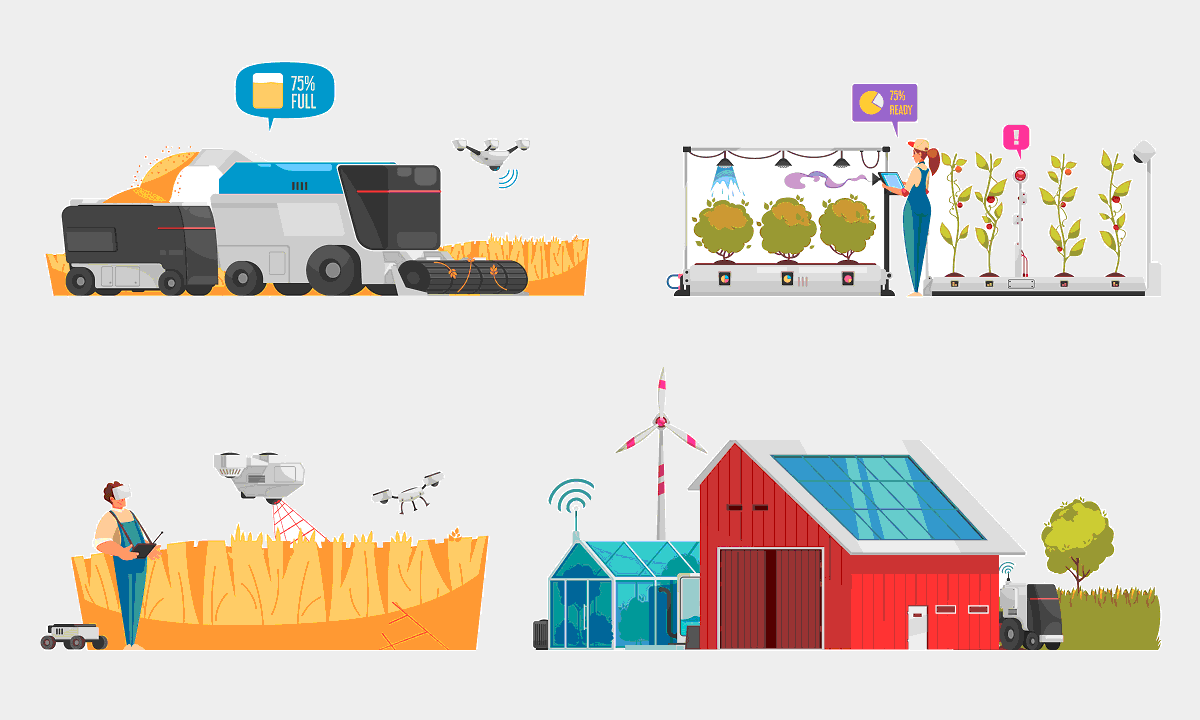
Future Careers in Food and Agriculture Technology
Introduction to Food and Agriculture Technology
In the modern world, the intersection of food and agriculture technology represents a transformative field that merges traditional agricultural practices with advanced technological innovations. This dynamic sector addresses some of the most pressing global challenges, including food security, sustainability, and climate change. Food and agriculture technology encompasses a wide range of disciplines, including biotechnology, precision agriculture, and smart farming technologies, all aimed at enhancing food production and ensuring sustainable agricultural practices.
Technological Advancements in Food and Agriculture
The advancements in food and agriculture technology are nothing short of revolutionary. Cutting-edge technologies such as drones, artificial intelligence (AI), the Internet of Things (IoT), and biotechnology are reshaping the landscape of agriculture and food production.
Drones and AI: Drones equipped with high-resolution cameras and sensors are being used for crop monitoring, soil analysis, and pest management. They provide real-time data that help farmers make informed decisions, increasing efficiency and reducing costs. AI algorithms process this data to predict crop yields, identify disease outbreaks, and optimize resource usage.
IoT in Agriculture: IoT devices are transforming farms into smart, connected systems. Sensors placed in fields monitor soil moisture, temperature, and nutrient levels, allowing for precise irrigation and fertilization. This not only conserves resources but also enhances crop yields.
Biotechnology: Biotechnology in agriculture involves the use of genetic engineering to develop crops that are resistant to pests, diseases, and harsh environmental conditions. Genetically modified organisms (GMOs) have higher yields and require fewer chemical inputs, contributing to sustainable farming practices.
Case Studies of Successful Implementation
Several case studies highlight the successful implementation of these technologies:
Case Study 1: Precision Agriculture in the USA A large-scale farm in the Midwest United States adopted precision agriculture techniques using GPS-guided machinery and satellite imagery. This integration allowed for precise planting, fertilizing, and harvesting, resulting in a 20% increase in crop yield and a 30% reduction in fertilizer use.
Case Study 2: Smart Farming in the Netherlands In the Netherlands, a country known for its advanced agricultural practices, farmers are using IoT-based greenhouse systems. These systems automatically adjust lighting, temperature, and humidity levels, creating optimal growing conditions. The result is higher-quality produce with lower energy consumption.
Case Study 3: Biotechnology in India Indian farmers have embraced genetically modified Bt cotton, which is resistant to the bollworm pest. This adoption has led to a significant increase in cotton yields and a reduction in pesticide use, benefiting both the environment and the farmers' incomes.
Educational Pathways in Food and Agriculture Technology
Pursuing a career in food and agriculture technology requires a solid educational foundation. Various courses and degrees are available, catering to the diverse interests within this field.
Relevant Courses and Degrees:
- Bachelor’s Degree in Food Science and Technology: Covers topics such as food chemistry, microbiology, and processing techniques.
- Bachelor’s Degree in Agricultural Engineering: Focuses on the application of engineering principles to agriculture, including machinery design and soil science.
- Master’s Degree in Precision Agriculture: Offers advanced training in the use of technology for precision farming.
- Ph.D. in Biotechnology: Provides in-depth knowledge of genetic engineering and its applications in agriculture.
Leading Institutions Offering These Programs:
- University of California, Davis (UC Davis): Known for its comprehensive programs in agricultural and environmental sciences.
- Wageningen University & Research (WUR): A leading institution in the Netherlands specializing in life sciences and natural resources.
- Cornell University: Offers top-tier programs in food science and agricultural engineering.
- Indian Agricultural Research Institute (IARI): Renowned for its research and education in agricultural sciences.
Career Opportunities in Food and Agriculture Technology
The career opportunities in food and agriculture technology are vast and varied, catering to a range of interests and skills.
Types of Jobs Available:
- Agricultural Engineers: Design and develop machinery and systems for farming and food production.
- Food Scientists: Study the physical, chemical, and microbiological properties of food and develop new food products.
- Agronomists: Focus on crop production and soil management to improve agricultural productivity.
- Precision Agriculture Specialists: Use technology to analyze farm data and optimize farming practices.
- Biotechnologists: Apply genetic engineering techniques to improve crop resistance and yields.
Skills and Qualifications Needed:
- Technical Skills: Proficiency in using advanced technologies such as GIS, drones, and IoT devices.
- Analytical Skills: Ability to analyze data and make informed decisions.
- Problem-Solving Skills: Creativity in developing innovative solutions to agricultural challenges.
- Communication Skills: Effective communication of technical information to non-technical stakeholders.
- Educational Qualifications: A relevant degree in food science, agricultural engineering, biotechnology, or a related field.
Market Demand for Food Technology Professionals
The demand for skilled professionals in food and agriculture technology is growing rapidly. This trend is driven by the increasing need for sustainable food production methods and the global challenge of feeding a growing population.
Current Job Market Trends:
- Rising Demand for Precision Agriculture Specialists: As farmers adopt precision agriculture techniques, there is a growing need for experts who can implement and manage these technologies.
- Increased Focus on Sustainability: Companies and governments are investing in sustainable agricultural practices, creating job opportunities in this area.
- Expansion of the Agritech Industry: The agritech sector is expanding, with startups and established companies seeking skilled professionals to develop and deploy innovative solutions.
Global Demand for Food Technology Professionals:
- United States: The U.S. leads in the adoption of advanced agricultural technologies, driving demand for professionals in this field.
- Europe: Countries like the Netherlands and Germany are at the forefront of smart farming and sustainable agriculture, requiring skilled workers.
- Asia: With large populations and agricultural economies, countries like India and China are investing heavily in agritech, creating numerous career opportunities.
Sustainability and Innovation in Agriculture
Technology plays a crucial role in promoting sustainability in agriculture. By enhancing efficiency and reducing resource usage, technological innovations contribute to environmental conservation and food security.
Role of Technology in Sustainable Agriculture:
- Precision Agriculture: Minimizes waste and maximizes yield by applying inputs (water, fertilizers) precisely where needed.
- Biotechnology: Reduces the need for chemical pesticides and fertilizers through genetically engineered crops.
- Smart Irrigation Systems: Use sensors and weather data to optimize water usage, conserving this vital resource.
Impact on Food Security and Environmental Conservation:
- Increased Food Production: Advanced technologies enable higher crop yields, contributing to global food security.
- Reduced Environmental Impact: Technologies such as precision agriculture and biotechnology reduce the environmental footprint of farming.
- Conservation of Natural Resources: Efficient use of water, soil, and energy resources supports sustainable agricultural practices.
Future Outlook for Food and Agriculture Technology
The future of food and agriculture technology is promising, with continuous advancements and emerging trends shaping the industry.
Predictions for Industry Growth:
- Continued Technological Advancements: Innovations in AI, robotics, and biotechnology will drive further improvements in agricultural productivity and sustainability.
- Increased Adoption of Smart Farming: Farmers worldwide will increasingly adopt smart farming technologies, creating demand for skilled professionals.
- Expansion of the Agritech Industry: The agritech sector will continue to grow, offering new career opportunities and driving economic development.
Emerging Trends and Opportunities:
- Vertical Farming: The rise of vertical farming, which uses stacked layers to grow crops indoors, presents new opportunities for food production in urban areas.
- Blockchain in Agriculture: Blockchain technology is being used to improve traceability and transparency in the food supply chain.
- Climate-Resilient Crops: Development of crops that can withstand extreme weather conditions will become increasingly important in the face of climate change.
Conclusion
Food and agriculture technology represents a dynamic and evolving field with immense potential for the future. As technological advancements continue to transform agriculture, the demand for skilled professionals will grow. Pursuing a career in this sector offers not only exciting job opportunities but also the chance to contribute to global food security and sustainability.
Whether you are a high school student exploring future career paths, a professional considering a career switch, or an educator guiding students, the field of food and agriculture technology offers a promising and rewarding future. With the right education and skills, you can be at the forefront of this technological revolution, driving innovation and making a significant impact on the world.
Agricultural Science Food Technology





